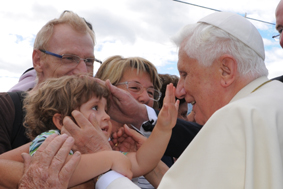Because of our own busy-ness, I’ve not really been up on what the Pope’s activities since WYD. I knew he was on vacation in Bressanone in Northern Italy, but today was the first time I’d had to peruse the Papa Ratzinger Forum and catch up.
 Today, the Pope met with priests and seminarians (the text of the Pope’s answers to their questions has not been released by the Vatican yet – we only have a L’Osservatore Romano piece summarizing the questions.)
Today, the Pope met with priests and seminarians (the text of the Pope’s answers to their questions has not been released by the Vatican yet – we only have a L’Osservatore Romano piece summarizing the questions.)
UPDATE: Here’s the transcript
Yesterday (Tuesday), he visited a tiny hamlet called Oies, which was the birthplace of St. Joseph Freinademetz SVD, pioneer of the Divine Word Missionaries in China.
I’d encourage you to head over to the SVD site and read the saint’s biography. Truly fascinating. A missionary to China, initially disappointed by and contemptuous of the Chinese people, he was transformed to the point that he immersed himself in the life and culture, and came to love and deeply value those whom he served. Teresa Benedetto has translated the OR piece (the original is here):
The Pope flew up Tuesday afternoon to the 1500-meter altitude of Val Badia to a village called Oies with 15 residents and a handful of houses.
While he spoke, the Pope faced the church’s great Crucifix, in which Jesus is portrayed with almond-shaped eyes.
He did it because among these mountains is a piece of China – the birthplace of St. Josef Freinademetz, born 1852, a Divine Word missionary who came to call himself ‘Chinese in everything and for all purposes’.
Speaking extemporaneously in the new church of Oies, which is shaped like a Chinese pagoda, Benedict XVI expressed the wish once again that China may open to the Gospel.
Faith, he said, does not alienate any people or culture, much less the Chinese who are becoming ever more important in politics, economics, and even ‘in the life of ideas’.
All cultures, the Pope said, await Christ, and civilizations can only become fully mature in him. This holds true in China as well.
He referred to the great relevance of St. Joseph Freinademetz’s testimony in opening the greatChinese nation to the Gospel. A testimony, he said, that strengthens the faith of every believer – in China as elsewhere.
The Pope summarized his thoughts in the guest book at the natal house-museum of St. Joseph, writing in German: “May the Lord, through the intercession of St. Joseph Freinademetz, grant many spiritual vocations, and open China ever more to faith in Jesus.”
The guest book lists many Chinese visitors, among them, the first Chinese cardinal, Thomas Tien Chen Sin, who came here in 1963.
This last was a surprise to the Pope, who had come here to celebrate the story of a man of the Tyrolean Alps who became as Chinese as the people he came to serve and love.
snip
In his brief tour of the Freinademetz house-museum, the Pope was guided by Fr. Girardi, procurator general of the Society of the Divine Word (the order to which St. Joseph belonged), and by the museum custodian Fr. Irsara.
He spent more time than scheduled in the house, staying more than half an hour and listening with emotion as his guides recounted the highlights of St. Joseph’s life.
Before leaving, he knelt in adoration before the Blessed Sacrament in the museum’s small chapel, and then proceeded to the church built in 2003 for the benefit of the increasing number of pilgrims to the shrine.
He was given a wooden statue of the Madonna that had been carved in Val Gardena. In turn, he gave a chasuble to the Church. After his remarks to the faithful, he led them in reciting the Lord’s Prayer in Latin, and then imparted his apostolic blessing.
Before leaving, he added a few words to thank all those present for the ‘sacrifice and courage’ they showed in coming to see him.

